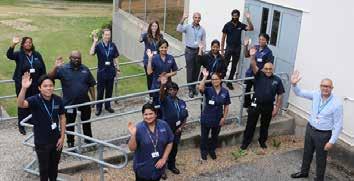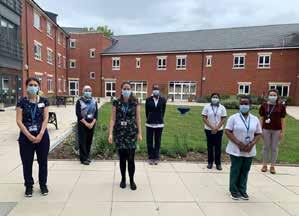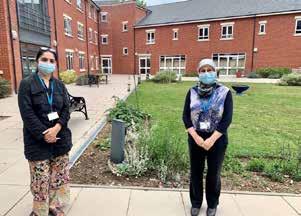
5 minute read
Community stories
District nurses at the heart of the community
District nurses, which include the twilight and night teams, are at the heart of community care. They play a crucial role in delivering nursing care for Brent residents.
Advertisement
During the pandemic they continued to ensure that their patients were safely cared for at home. They empowered patients’ families to support their loved one’s care, minimising their level of contact wherever possible, particularly for our more vulnerable patients. They also continued to support primary care colleagues by visiting patients who were shielding so unable to attend their GP practice or hospital appointments.
The team worked day and night with their colleagues from the bladder and bowel and care co-ordinator teams to ensure that demand was met, and that patient care was never compromised but delivered safely at home.
Head Nurse, Edgar Swart, says he is proud to be part of the district nursing team: “District nurses incorporate their many skills in meeting the complex health and nursing needs of people in a dynamic, multicultural and diverse borough.

STARRS continue to shine brightly
Our Short Term Assessment, Rehabilitation, Reablement Service (STARRS) team did a fantastic job during the Covid-19 pandemic. They not only prevented patients from needing care in hospital, but also supported hospital discharges. STARRS is an umbrella term for several teams, including Rapid Response Brent, Early Supported

Discharge, hospital discharge co-ordinators, as well as a small team of nurses and therapists who work in the emergency department to help prevent hospital admissions. Head nurse Edgar Swart says the team rolled up their sleeves and helped their colleagues in other areas at the height of the pandemic: “A nurse from Early Supported Discharge, together with a paramedic and nurse from Rapid Response, supported our infectious disease team with community patient testing for Covid-19. STARRS also supported the anticoagulation and haematology teams with shielding patients. These were patients who would normally come to hospital to have their bloods taken for testing. We carried out more than 900 anticoagulation visits and 10-20 haematology visits. One of the STARRS paramedics also supported the occupational health team with staff testing for Covid-19. “Between hospital avoidances and early supported discharges from Northwick Park and Central Middlesex hospitals, both teams worked and supported each other to ensure that patients were cared for safely in community.

AMU nursing staff redeploy to Ealing’s Covid wards
On 24 March the Acute Medical Unit (AMU) at Ealing was temporarily closed in response to the pandemic. Mairead Sheahan, AMU Clinical Nurse Manager, explains what happened next. “AMU staff were redeployed to the Covid wards where their skills were needed to care for acutely unwell patients and those needing Level 2 care such as Bilevel Positive Airway Pressure and Continuous Positive Airway Pressure. “The team responded well in caring for severely ill patients who staff could see deteriorating right in front them. It was also emotionally draining to see patients pass away without their relatives being able to be with them. “I am very proud of how our nurses responded to the pandemic. They worked tirelessly throughout the crisis and never complained about having to work across different wards in the hospital.”



Reflections from our rehab services
From the outset of the pandemic inpatient rehabilitation services needed to adjust their care requirements. Tricia Botten, clinical matron Robertson Ward, Willesden Centre for Health and Care looks back on that time.
“The general rehab service at Central Middlesex Hospital quickly developed into a backup service for the acute medical beds and played its part in providing care to patients with Covid-19 in their acute recovery phase. Our staff were accommodating and used patient monitoring skills that have not been required by them for several years, while still motivating patients to be responsible for their physical recovery and rehabilitation.
The staff were flexible across the service, working with colleagues from other divisions, to ensure safe and quality patient care. The rehab service was halted in mid May as part of the plans to turn the hospital into a Covid protected elective surgical site. Staff have been temporarily redeployed across our Trust while long-term plans are worked through. The neurorehabilitation service at the Willesden Centre needed to make key changes to service provision during the pandemic. Any patient exhibiting symptoms of Covid-19 was transferred to an acute setting for treatment and monitoring for any deterioration in their well-being and clinical presentation. During early April, 30% of patients had Covid on Robertson Ward. We closed to new admissions and the ward was treated as a home environment with all the patients self-isolating for 14 days. This led to a feeling of family and staff engaged with patients as a family member would - encouraging the rehabilitation programme to be maintained but also enabling virtual visiting calls to be made so helping

patients to keep in touch with their families. Unfortunately, a number of our staff were affected by the virus, with three members needing to be hospitalised. I am pleased to say that these colleagues are all now well into their recovery and have either returned, or are about to return, to work.
Business as usual has returned with the government guidelines being strictly adhered to. Visiting remains difficult and we are working with our senior nursing team to find ways to bring back face-to-face visiting in the garden at the Willesden Centre. Both personally and professionally it was sad to see the changes we had to make to our service. But throughout the pandemic, the staff were amazing. They went the extra mile to celebrate lockdown birthdays, and ensure that virtual visiting took place on these special days so our patients felt loved and appreciated.”


Business as usual has returned with the government guidelines being strictly adhered to. Visiting remains difficult and we are working with the Trust’s senior nursing team to find ways to facilitate face-to-face visiting using the garden at Willesden as outside space.






